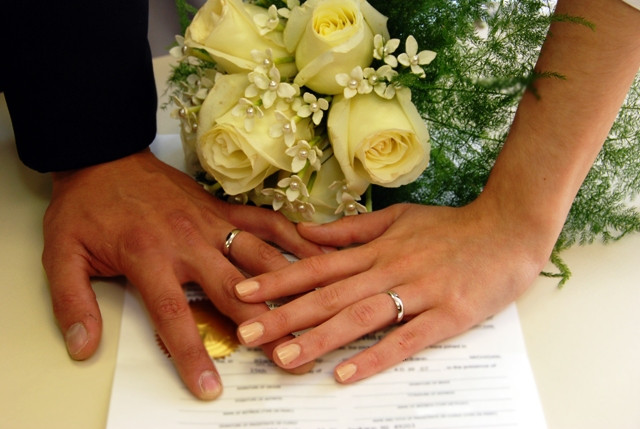We spent many a year painting the town red, indulging in mischief and being what we were – a group of youngsters living it up and doing the things the young the world over do.
Their love blossomed as the years wore on. After settling down in their respective careers, Ava and Neil decided it was time to culminate their relationship into marriage. Somewhere in the recesses of my mind, I had always known that the couple had a long struggle ahead of them but I had never fathomed that the future would pan out so differently than we’d imagined. You see, Neil and Ava practised different religions.
As expected, both sets of parents objected to their wedding. A drama ensued – tears were shed, attempts were made at emotionally blackmailing the pair and as I’d feared, they were pried apart.
After the enforced break up, our small group of friends had hoped that the two would find joy with the partners their parents chose for them but that was not to be.
Ava was married off a year later but marital happiness has eluded my dear friend. She’s enmeshed in a dysfunctional relationship with an incompatible partner with whom she has little in common. Despite the numerous attempts she’s made at smoothening out the differences between herself and her spouse, the discord persists. Her sorrow is palpable.
During a visit to her house one day, I stood outside her apartment for a couple of minutes, hesitant to enter and make my presence known as her husband’s belligerent tone assailed my ears. As I heard him hurl abuses at Ava, I walked away, overwhelmed with feelings of sorrow at my friend’s plight and anger towards her family for the havoc they had wreaked in her life, albeit unintentionally.
The sullen woman, she has metamorphosed into is a far cry from the carefree, cheerful and fun loving girl I once knew. Her misery has been exacerbated by her sense of loss – of once having it all, before being forced to give it up. As Ellis Boyd Redding, would have succinctly put it,
“A whole life blown away in the blink of an eye. Nothing left but all the time in the world to think about it.”
Neil, on the other hand, remains resolute in his decision to stay single. His mother has a long string of women she’d like her son to choose his bride from, but he has, so far, shown no inclination towards marriage. His unwavering resolve is, without doubt, a fount of distress for his family.
I can’t help but question the wisdom of a decision that has brought nothing but anguish to all the parties involved. Entering into matrimony with a person who follows the same faith does not guarantee a successful marriage – marrying a compatible partner does.
There are those who find love and companionship within their communities, however, there are others who find it outside. If one is fortunate enough to meet an individual who fits the bill of one’s notion of an ‘ideal partner’ is it logical or even fair to expect him to let go of an alliance, that he deems perfect, on account of religious differences?
Finding a soul mate is difficult as it is; limiting one’s choices does not seem like such a prudent idea.
The thought that keeps reverberating in my mind is – how obtuse would a parent have to be to believe that religious beliefs and considerations supersede all else- even the happiness of one’s own child?
Rigid, antiquated religious or social diktats that restrict personal liberties have no place in modern society.
Shedding inhibitions, brought about by regressive social and religious customs, that curb an individual’s freedom of choice, is the hallmark of a progressive mindset. Ancient religious practices that infringe on a person’s fundamental right to choose his own life partner must be done away with. Every member of a civilised society should have the freedom to exercise his right to love and marry as per his wishes without any interference or threat from any quarter.
I don’t have to look beyond my own family to find examples of successful marriages between people of different religions, castes and ethnicities. Relationships between people of different faiths have worked because the language of love is universal and is comprehended by all irrespective of the god they pay obeisance to.
As the cliché goes – love is blind; blind even to religious differences.
In such relationships, couples learn to celebrate and cherish their differences rather than squabble over them.
Religious conversions should not be a pre requisite for such multi faith unions. Individuals can continue to follow their faith while being a part of a joyous marriage to a person who follows a different religion. It’s unfair to expect a woman to let go of her belief system and thereby alter her identity just to please her new family. Converting for the wrong reasons will only sow the seeds of resentment and put a strain on the relationship.
A person should embrace a new religion because he wants to, not because he is compelled to.
I have always felt that too much time is spent worrying about which religion the offspring of such marriages should follow. How about exposing them to both religions and then letting them exercise their constitutional right to practice any faith of their choice? It’s commendable that the children of such marriages grow up truly understanding and respecting the importance of diversity.
In a country like India, where people of various faiths co-exist peacefully and mingle freely with each other in schools, colleges, offices and neighbourhoods, such relationships should not come as a surprise. Inter-religion unions are the obvious result of a pluralistic society and should be hailed as a step towards integrating and unifying a mind bogglingly diverse nation. These unions are a lesson in love, tolerance and acceptance.
Although inter-religion marriages are becoming a common occurrence in India and beyond, society still has a long way to go in ensuring that no other couple meets the calamitous fate of my unfortunate friends.
The only dream that I have for my unborn children is to see them happy. Whether they find this happiness with a Parsi, a Christian, a Jew, a Muslim, a Sikh, a Jain, a Buddhist, a Hindu or even an atheist is inconsequential to me.
I’ll be happy as long as they are!
Names in the article have been changed to protect their identities.
Read more by Bhakti here.



COMMENTS
Comments are moderated and generally will be posted if they are on-topic and not abusive.
For more information, please see our Comments FAQ